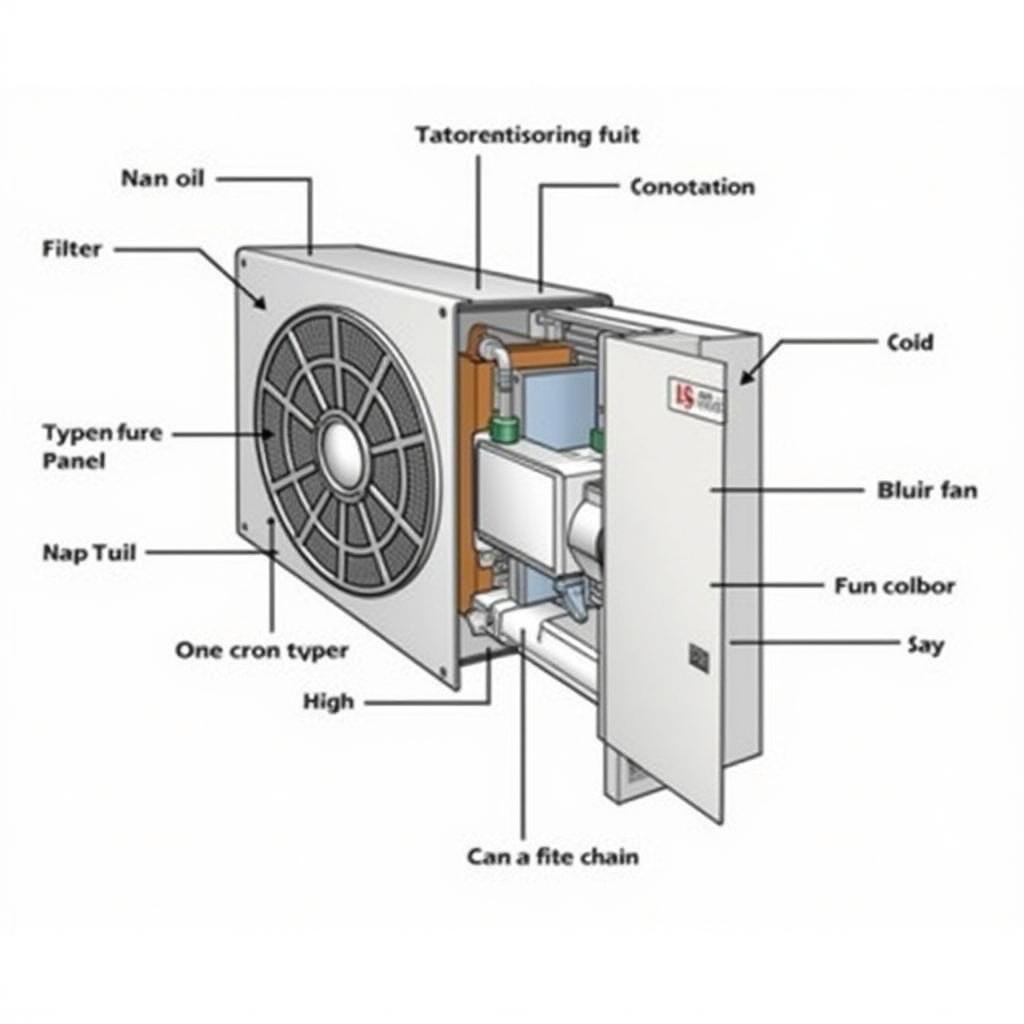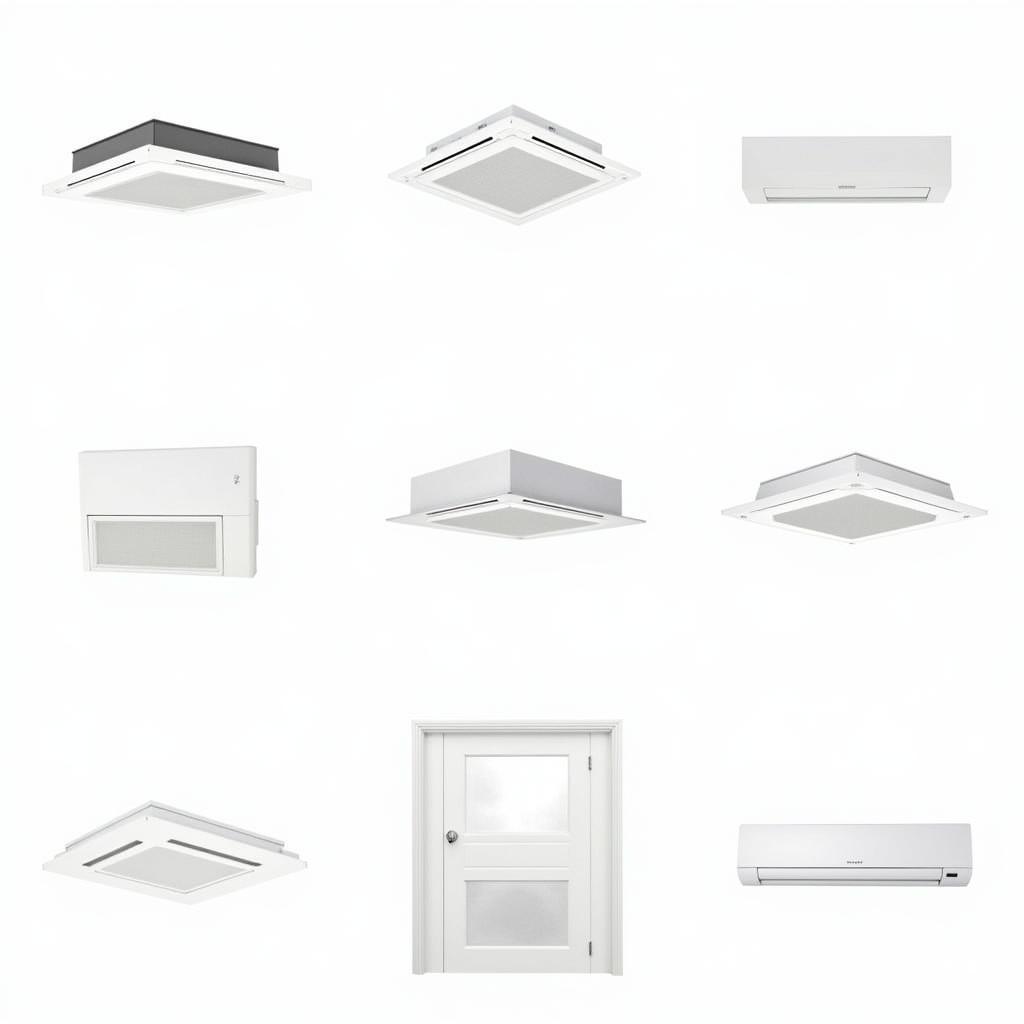A Fan Coil Unit System is a common choice for providing heating and cooling solutions in residential, commercial, and industrial buildings. It offers flexible temperature control for individual rooms while potentially reducing energy consumption compared to traditional HVAC systems.
What is a Fan Coil Unit System and How Does it Work?
 Fan Coil Unit Components
Fan Coil Unit Components
A fan coil unit system, often abbreviated as FCUs, is a type of HVAC system that utilizes a combination of fan coils and a central plant to condition and distribute air throughout a building. The system comprises two main components:
-
Fan Coil Units: These units are typically installed in each room or designated zone within a building. They contain a fan, a heating or cooling coil, and an air filter. The fan draws in air from the room, passes it over the coil, and then distributes the conditioned air back into the space.
-
Central Plant: The central plant generates chilled water, hot water, or a combination of both depending on the heating and cooling demands. This conditioned water is then pumped through a network of pipes to the individual fan coil units located throughout the building.
The fan coil units are connected to the central plant through a closed-loop piping system.
How a Fan Coil Unit System Operates:
-
Thermostat Control: Each room with a fan coil unit has a thermostat that allows occupants to set their desired temperature.
-
Signal to the Control Valve: When the thermostat detects a temperature difference from the setpoint, it sends a signal to the control valve in the fan coil unit.
-
Water Flow Regulation: The control valve regulates the flow of chilled or hot water through the coil within the unit, depending on the heating or cooling requirement.
-
Air Conditioning: The fan within the unit draws air from the room, passes it over the coil where it is heated or cooled, and then blows the conditioned air back into the room.
-
Continuous Circulation: The water, after passing through the fan coil unit, returns to the central plant to be reconditioned and recirculated throughout the system.
Types of Fan Coil Units
 Different Types of Fan Coil Units
Different Types of Fan Coil Units
Fan coil units are available in various configurations to suit different installation requirements and aesthetic preferences. Some common types include:
-
Ceiling-Cassette Units: These units are installed within the ceiling, offering a discreet solution for air distribution. They are ideal for rooms with limited wall space.
-
Wall-Mounted Units: As the name suggests, these units are mounted on walls, typically below windows. They offer a space-saving option for smaller rooms.
-
Floor-Mounted Units: These units are installed at floor level and are suitable for larger spaces where wall or ceiling mounting is not feasible.
-
Ducted Units: These units connect to a duct system, allowing for the conditioned air to be distributed to multiple rooms or zones from a single unit.
Advantages of Fan Coil Unit Systems
Fan coil unit systems offer several advantages over other HVAC systems:
-
Individual Temperature Control: One of the significant advantages of FCUs is their ability to provide individualized temperature control for each room or zone. This allows occupants to adjust the temperature according to their comfort levels, improving overall satisfaction.
-
Energy Efficiency: FCUs can contribute to energy savings as they only condition the air in occupied spaces. By turning off the units in unoccupied rooms, you can minimize energy wastage.
-
Improved Indoor Air Quality: The air filter within each fan coil unit helps to remove dust, allergens, and other airborne particles, contributing to improved indoor air quality.
-
Flexibility in Installation: FCUs offer flexibility in installation due to their compact size and various configuration options. This makes them suitable for a wide range of building types and layouts.
Considerations for Fan Coil Unit Systems
While fan coil unit systems offer several benefits, there are some factors to consider:
-
Maintenance: Regular maintenance is essential to ensure the efficient and effective operation of the system. This includes cleaning or replacing air filters, checking for leaks, and inspecting the coils for any signs of damage.
-
Noise Levels: Some fan coil units can generate noise, particularly at higher fan speeds. It’s essential to select units with acceptable noise levels, especially for noise-sensitive environments like bedrooms.
-
Aesthetics: Depending on the unit type and installation, fan coil units can be more visible than other HVAC systems. It’s crucial to choose units that blend seamlessly with the room’s aesthetics.
Fan Coil Unit System Maintenance
Proper maintenance is crucial for maximizing the lifespan and efficiency of your fan coil linkage controller 3ph-801. Regular maintenance tasks include:
-
Filter Replacement: Regularly replace air filters, typically every three months or as recommended by the manufacturer. Clogged filters restrict airflow, reduce efficiency, and can negatively impact indoor air quality.
-
Coil Cleaning: Clean the coils annually or as needed. Dust and debris buildup on the coils reduces heat transfer efficiency, leading to higher energy consumption.
-
Condensate Drain Inspection: Regularly inspect and clean the condensate drain line to prevent clogs. A clogged drain line can cause water leaks and potential damage.
-
Professional Servicing: Schedule annual professional servicing to inspect the entire system, including the motor, fan belt, electrical components, and refrigerant levels (if applicable).
Conclusion
A fan coil unit system can be an efficient and effective solution for providing personalized comfort in your building. By understanding its working principles, different types, advantages, and maintenance requirements, you can make an informed decision about whether an FCU system is the right choice for your needs.
For expert advice on selecting, installing, or maintaining a daikin chilled water fan coil unit catalogue, contact a qualified HVAC professional.
FAQs About Fan Coil Unit Systems
1. What is the typical lifespan of a fan coil unit?
With proper maintenance, a fan coil unit can last for 15-20 years.
2. Are fan coil units noisy?
Noise levels vary depending on the unit’s design and fan speed. Quiet fan coil units are available for noise-sensitive applications.
3. Can I install a fan coil unit system in an existing building?
Yes, FCUs can be retrofitted into existing buildings, but it might require some modifications to the piping and electrical systems.
4. Do fan coil units require ductwork?
Some types of fan coil units, like ducted units, require ductwork. However, other types, like wall-mounted and ceiling-cassette units, do not.
5. What is the difference between a fan coil unit and a heat pump?
While both systems can provide heating and cooling, a heat pump uses refrigerant to transfer heat, whereas a fan coil unit relies on chilled or hot water from a central plant.
Need Help with Your Fan System?
For any questions or assistance regarding fan systems, including fan dust explosion-proof solutions, our team is here to help.
Explore More about Fan Coil Units in Vietnamese:
To learn more about fan coil unit tiếng việt là gì, visit our dedicated page with information in Vietnamese.
Discover the Benefits of Reetech Fan Coil Units:
Find out more about the advantages and features of fan coil unit reetech on our dedicated product page.
Contact Us:
Phone Number: 0903426737
Email: fansbongda@gmail.com
Visit Us:
Tổ 9, Khu 6, Phường Giếng Đáy, Thành Phố Hạ Long, Giếng Đáy, Hạ Long, Quảng Ninh, Việt Nam.
Our customer support team is available 24/7 to assist you.


